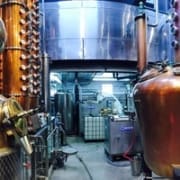Learn the craft or hire for experience? West Michigan craft distilleries take two paths to ramp up production (MiBiz)
When the founders of Long Road Distillers LLC decided to bring in an experienced professional to manage the launch of its spirits production later this year, they realized they needed to look beyond the local talent pool for help.
That realization led partners Kyle Van Strien and Jon O’Connor to recruit Brian Pribyl as the startup’s first head distiller. While the two partners did their homework before starting the company, they felt leveraging the knowledge of an experienced industry professional would give Long Road a competitive edge.
“Kyle and I worked with others in the industry to mentor us along with learning the trade, but we knew that at the end of the day, the real way for us to be successful was to have a real expert in-house that has the knowledge and the skill set that can make us the best,” O’Connor told MiBiz.
Ironically, it wasn’t West Michigan’s nascent craft distilling industry that drew Pribyl to the area; credit the region’s other craft beverage scene for that.
“I fell in love with the beer,” Pribyl said.
Instead of being competitors in the alcoholic beverage space, Pribyl sees craft brewing and craft distilling as complementary sectors, with both industries satisfying customers’ demand for locally sourced products.
“There’s a lot of tradition behind distilling, and it’s one more step for brewing, especially for the city of Grand Rapids,” he said. “It’s a natural progression.”
Apprentice to the trade
While the craft brewing industry is filled with home brewers who turned a hobby into a profession, federal laws against moonshining make that career path illegal for craft distilleries, which makes it more difficult to find and develop talent, Van Strien said.
That leaves startups like Long Road with the choice either to hire experienced outside help or to learn the craft under the tutelage of others distillers.
Walter Catton, owner and head distiller at the Holland-based Coppercraft Distillery LLC, opted for the latter route.
After learning the business side of the industry in his career as a CPA and as a former partner and CFO of New Holland Brewing Co. which also makes a line of spirits, he spent weeks gathering insight into the trade from other established craft distillers, including Colorado-based Breckenridge Distillery and Smooth Ambler Spirits Co. of West Virginia.
“I spent two and a half years putting this together, and a year and half of that was the learning, dialing recipes in and proving out everything else,” Catton said. “I spent time with distillers learning to do everything from priming a pump to alcohol proofing.”
Tapping industry veterans
While Van Strien and O’Connor also spent time consulting others in the industry, they wanted experienced help with the intricacies of distilling. The partners plan to work closely with Pribyl throughout the distilling process to develop the spirits, but they’re relying on his expertise to craft a quality product.
“You can make or break a batch by even going five minutes too fast,” Pribyl said. “It’s very precise.”
Pribyl started his career a decade ago and began working at Newport, Ore.-based Rogue Ales & Spirits after attending Oregon State University’s fermentation science program. While in Oregon, Pribyl helped the Rogue distillery navigate an expansion and worked on the company’s Dead Guy Whiskey along with several gins and vodkas, including the launch of a chipotle spirit.
For the last two years, Pribyl has worked in Tennessee, where he helped two distilleries get off the ground and expand. He helped launch Popcorn Sutton Distilling LLC’s Tennessee White Whisky brand, nearly doubling its capacity. After Popcorn Sutton, Pribyl moved to Prichard’s Distillery Inc. to help the company establish a satellite operation in Fontanel, Tenn.
All of Pribyl’s experience with startup operations and expansions made him an ideal candidate for what Long Road is trying to accomplish in West Michigan, O’Connor said.
Both Coppercraft and Long Road are among the latest wave of industry growth that should swell the ranks of craft distillers nationally to around 500 by 2015, according to the American Craft Spirits Association.
The small but growing sector in Michigan of around two dozen companies ranks fourth nationally behind California, Oregon and Washington in the number of distilleries, according to the Michigan Craft Distillers Association, a new nonprofit that launched this month to market the statewide industry and serve as a voice for members in Lansing.
Grain-to-glass
Long Road has yet to distill its first batch as it’s currently renovating its facility and awaiting installation of a 500-liter, 18-plate still that it ordered from the German-based manufacturer Müller GmbH. The still should arrive in Grand Rapids within the next three weeks, Van Strien said.
The distillery will have an annual production capacity of approximately 7,000 cases once it becomes fully operational, O’Connor said.
“As soon as the equipment is in place, my goal is to get everything fired up and a vodka out of the door by day 12,” Pribyl said.
The company plans to immediately follow its vodka with varieties of gins and white whiskeys until the distillery begins the aging process for its bourbons and other spirits, a process that takes between two and five years, Pribyl said.
Long Road invested approximately $750,000 into its facility at 537 Leonard Street NW on Grand Rapids’ west side, as MiBiz previously reported. The company enlisted Grand Rapids-based Willink Construction Inc. as the contractor for the project, which was designed by The Design Forum Inc.
The distillery plans to adhere to a true “grain-to-glass” philosophy, incorporating as many local grains and fruits into its products as possible, Van Strien said. Initially, the distillery will only sell spirits out of its tasting room, but it plans to begin statewide distribution by late 2015.
With the global market for craft spirits on the rise, the Grand Rapids distillery aims to be in every state and have a presence in international markets in five years, Van Strien said.
“It might sound crazy, but I don’t think it’s all that far out of the question,” Van Strien said. “I think we can achieve that. The fact that we are doing this right is what sets us apart.”
John Wiegand, November 23, 2014











